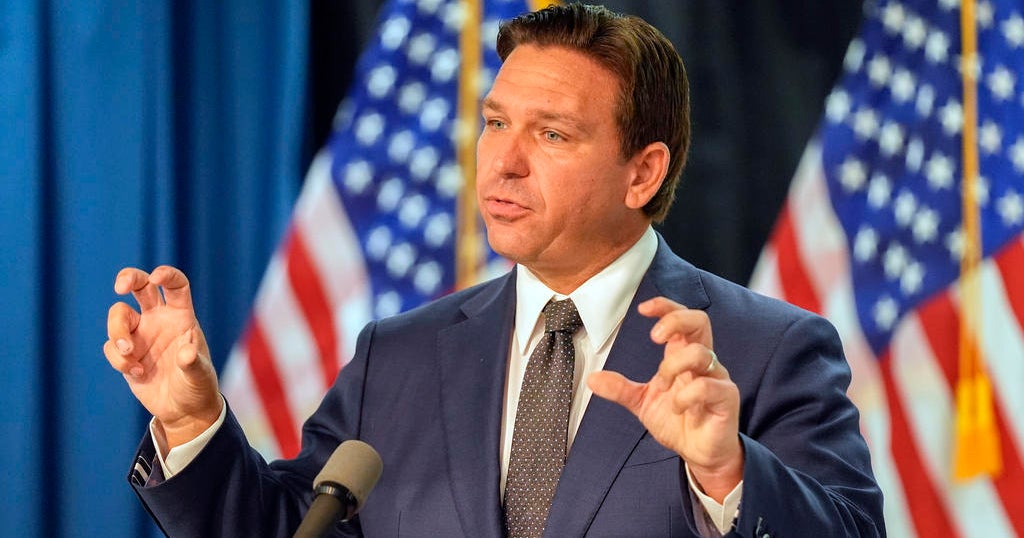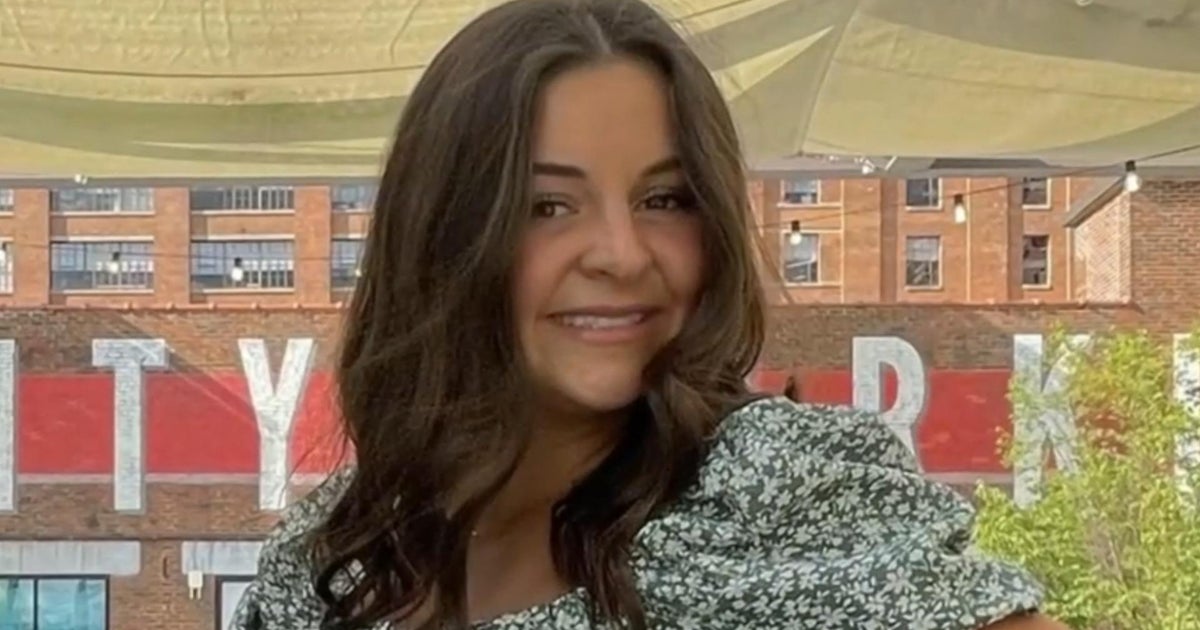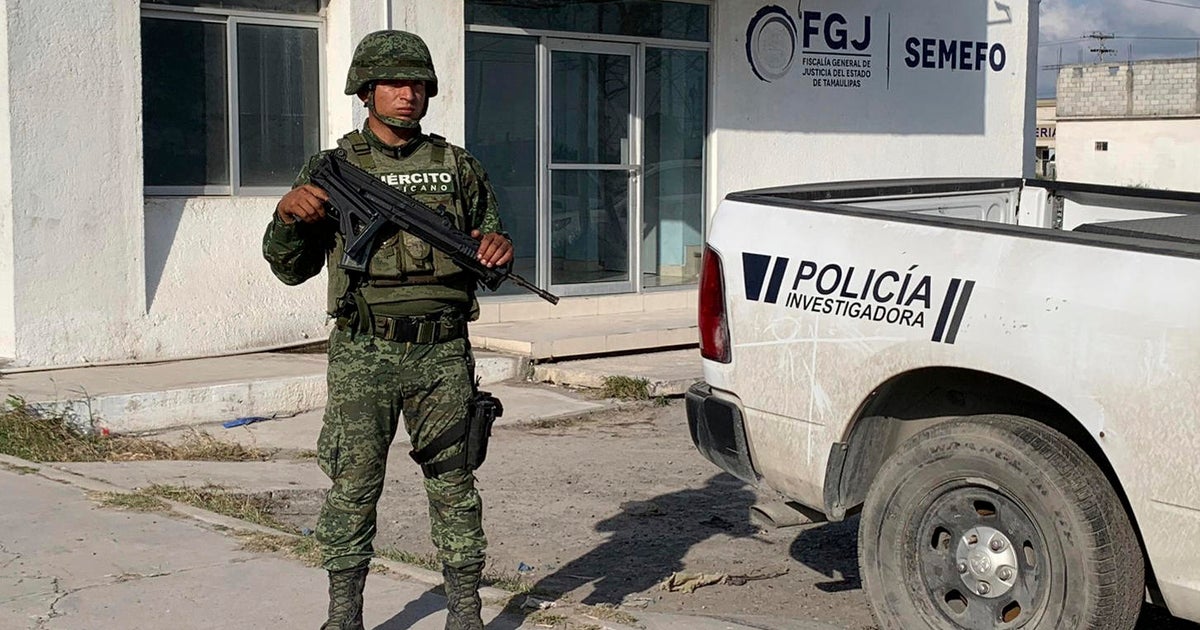Iran's President Ebrahim Raisi says he cannot trust Americans, calls sanctions "tyrannical"
The United States first placed financial sanctions on Iran back in 1979, during the hostage crisis. For nearly four decades the U.S. State Department has designated Iran one of the world's leading state sponsors of terrorism.
But the Obama administration, along with five other countries, agreed to billions of dollars in sanctions relief in exchange for Iran's agreement to dismantle much of its nuclear program and open its facilities to extensive international inspection.
The Trump administration, distrusting Tehran, pulled out of the deal and stepped up crushing economic pressure.
That's where Ebrahim Raisi found himself when he was elected president a year ago. Last month, Iran and the 61-year-old hardliner were on the verge of striking a new deal, but then Iran submitted demands that sent the nuclear talks into a stalemate.
We met President Raisi Tuesday at the presidential compound in Tehran for his first interview with a western reporter. I was told how to dress, not to sit before he did, and not to interrupt him. We were given one hour for the interview.
Lesley Stahl: Can we start with the negotiations on the nuclear deal. Do you want to- have that deal renewed? Because you know, there are some American officials who are beginning to think that you don't.
President Ebrahim Raisi (translation): If it's a good deal and fair deal, we would be serious about reaching an agreement. It needs to be lasting. There needs to be guarantees. If there were a guarantee, then the Americans could not withdraw from the deal.
Lesley Stahl: But you can pull out of the deal I mean, just as well as we could pull out of the deal.
President Ebrahim Raisi (translation): You see, the Americans broke their promises. They did it unilaterally. They said that, "I am out of the deal." Now making promises is becoming meaningless.
Lesley Stahl: Are you saying that you cannot trust the Americans?
President Ebrahim Raisi (translation): We cannot trust the Americans because of the behavior that we have already seen from them. That is why if there is no guarantee, there is no trust.
The U.S. Says the West can't trust Iran. For instance, when it claims its nuclear program is purely for peaceful purposes.
Lesley Stahl: As far as we can tell you don't use it for, ya know, things that can help your citizens, like electricity. You say you want it for peaceful reasons. Like what?
President Ebrahim Raisi (translation): Like in medicine, agriculture, oil, gas.
In terms of "peaceful purposes," one available figure – from the U.N. nuclear watchdog agency, the IAEA – is that only 1.8% of the country's electricity is generated by nuclear power.
Lesley Stahl: There seems to be some evidence that you had been working, at least before, toward a bomb, a bomb, a weapon, and that you might be doing that again.
President Ebrahim Raisi (translation): We have responded to these claims several times. They are baseless. The Islamic Republic of Iran has said many times that possessing nuclear weapons has no place in our doctrine.
However, the U.S. intelligence community has assessed "with high confidence" that Iran did attempt to develop a nuclear bomb in the past.
And then there are the American citizens being detained in Tehran, three of whom were born in Iran.
Lesley Stahl: If there is a deal-- would you agree to release the four Americans who are being held here? Could that be part of it?
President Ebrahim Raisi (translation): There are Iranian nationals also imprisoned inside the U.S. These people are only in there because they simply tried to circumvent sanctions. And the Americans, we have told them that we can talk to them about this. It can be conducted separately from the nuclear talks. It can be done between the two countries. It is a humanitarian issue. This can be negotiated.
Lesley Stahl: You're off to New York. You're going to speak at the United Nations. You know, President Biden is gonna be there. Are you open to a meeting with President Biden? A face-to-face?
President Ebrahim Raisi (translation): No. I don't think that such a meeting would happen. I don't believe having a meeting or a talk with him will be beneficial.
Lesley Stahl: What do you think the difference is, from your perspective, between the Trump administration and the Biden administration?
President Ebrahim Raisi (translation): The new administration in the U.S., they claim that they are different from the Trump administration. They have said it in their messages to us. But we haven't witnessed any changes in reality.
His major grievance againist President Biden is that he has maintained the sanctions on Iran that President Trump imposed.
President Ebrahim Raisi (translation): The sanctions are very tyrannical. This is a tyranny against the people of Iran. It is important to us to have the sanctions lifted.
The sanctions thrust Iran into a two-year recession, mainly because oil exports from refineries like this one, fell overnight from 2.8 million barrels a day to about 200,000. Businesses have been cut off from international banking. With inflation today in Iran at over 40%, virtually everything is more expensive.
And yet, we found traffic here as clogged as in New York. And as we saw, Tehran's bazaars are teeming with shoppers. The ones we met were friendly to us.
Boy: How are you?
Lesley Stahl: Oh, i'm good. How are you?
Boy: Fantastic. And you?
Lesley Stahl: Good. Do you study English in school?
Boy: No!
One reason for the bustling commerce is something the president calls the "resistance economy" in which businesses are encouraged to make more of the things themselves that they used to import: so, home made blue jeans.
Lesley Stahl: Do you know where these are made?
Merchant: In Iran.
Lesley Stahl: In Iran?
Merchant: In our country.
Also made in Iran: washing machines, refrigerators, TVs. They also have their own verison of Uber Eats called Snapp! Food.
Iran is home to one of the world's oldest civilizations, dating back to 4000 B.C. It's where the foundations of algebra and chemistry were developed.
Today, while there's attention to religious tradition in the Islamic Republic, it's one of the most westernized countries in the Middle East, with a well-educated population.
This mall could be anywhere in America, with an ice-skating rink, a food court with hot dogs and burgers, and the least expected – sexy window displays. And yet President Raisi just signed a decree making women who don't dress modestly subject to arrest.
A young woman died Friday after the morality police took her into custody for violating the rules on head coverings. Eyewitnesses say they saw her being beaten while in a police van. President Raisi's office says he ordered an investigation.
Sayyid Ebrahim Raisi descends from the Prophet Muhammad, as his black turban signifies, according to Shiite Muslim tradition. He's a hard-line, conservative cleric like his mentor, the Supreme Leader Ayatollah Khamenei.
Lesley Stahl: I want to ask you about your own record. There is a personal sanction against you. You took part in a commission that was responsible for executing up to 5,000 political dissidents. They were hanged or shot by firing squad. I want to ask if you regret that action.
President Ebrahim Raisi (translation): What kind of proof can you offer for this? These are just allegations and claims made by members of a terrorist group.
Lesley Stahl: You're saying that that was not true? And that the--
President Ebrahim Raisi (translation): Anybody who commits a crime in Iran stands trial in official courts of law and they receive punishments for what they did. They were assassinating people. And what happened to them was exactly proportionate to what they did.
But the U.S. Treasury Department sanctioned Raisi personally for human rights violations over this and Amnesty International called it a crime against humanity.
The president was feisty with us, sprinkling his answers with a predictable antipathy toward Israel and Jewish people.
The supreme leader, Ayatollah Khamenei, was scathing when he tweeted on the same subject in English in 2018:
"Israel is a malignant, cancerous tumor… that has to be removed and eradicated."
Lesley Stahl: Do you believe the Holocaust happened? That 6 million Jews were slaughtered?
President Ebrahim Raisi (translation): Look… Historical events should be investigated by researchers and historians. There are some signs that it happened. If so, they should allow it to be investigated and researched.
Lesley Stahl: So you're not sure, I'm getting that you're not sure. What about Israel's right to exist?
President Ebrahim Raisi (translation): You see, the people of Palestine are the reality. This is the right of the people of Palestine who were forced to leave their houses and motherland. The Americans are supporting this false regime there to take root and to be established there.
Lesley Stahl: You know that Morocco, Bahrain, Sudan, and the United Arab Emirates have all recognized Israel-- and have relations with Israel. And it is said that Saudi Arabia is also talking directly with Israel. And I wonder if you want to comment on that.
President Ebrahim Raisi (translation): If a state shakes hands with the Zionist regime, then they are also an accomplice to their crimes. And they are stabbing the very idea of Palestine in the back.
Lesley Stahl: You have vowed revenge on the U.S. government for the killing of your General Soleimani.
More than two years ago, the U.S. killed General Qassem Soleimani in a drone strike. A revered military hero in Iran, he masterminded deadly attacks on American forces throughout the region for years. The supreme leader has called for retaliation.
Lesley Stahl: Are you intending to retaliate by assassinating officials from the Trump administration?
President Ebrahim Raisi (translation): What the then American government did, by the direct order of Trump himself, to assassinate Mr. Qassem Soleimani, this was a heinous crime. We want justice to be served. We are not going to forget about this.
Lesley Stahl: I'm wondering what you mean by "justice." Does it mean an eye for an eye? There was this assassination, now we're gonna have you know, an answer assassination?
President Ebrahim Raisi (translation): That's the type of the actions that the Americans and Zionist regimes are doing in the world, we are not going to carry out the same actions.
And yet, the U.S. Department of Justice has charged a member of Iran's Revolutionary Guard with just that, plotting to assassinate John Bolton, President Trump's former national security adviser.
As he prepares for his trip to the U.N., President Raisi is defiant. His message: no concessions in the nuclear deal, Iran will not back down and it can survive the sanctions, which he says could well backfire against the united states.
President Ebrahim Raisi (translation): Yes, they can create restrictions and problems for us and difficulties. But there's a number of countries that are being sanctioned. By doing this, they are bringing them closer together, making them more united. And this will render American sanctions ineffective.
Lesley Stahl: Right, Chinese, Russians, Iranians getting closer.
President Ebrahim Raisi (translation): This approach won't work.
As we ended what seemed to be a cordial conversataion, we were surprised when a member of Raisi's staff reached up and blocked one of our cameramen from shooting our goodbyes.
Another one of our cameramen's phone was confiscated and held by President Raisi's security team for two and a half hours.
Produced by Richard Bonin. Associate producer, Mirella Brussani and Collette Richards. Field producer, Seyed Rahim Bathaei. Broadcast associates, Eliza Costas and Wren Woodson. Edited by Peter M. Berman.









